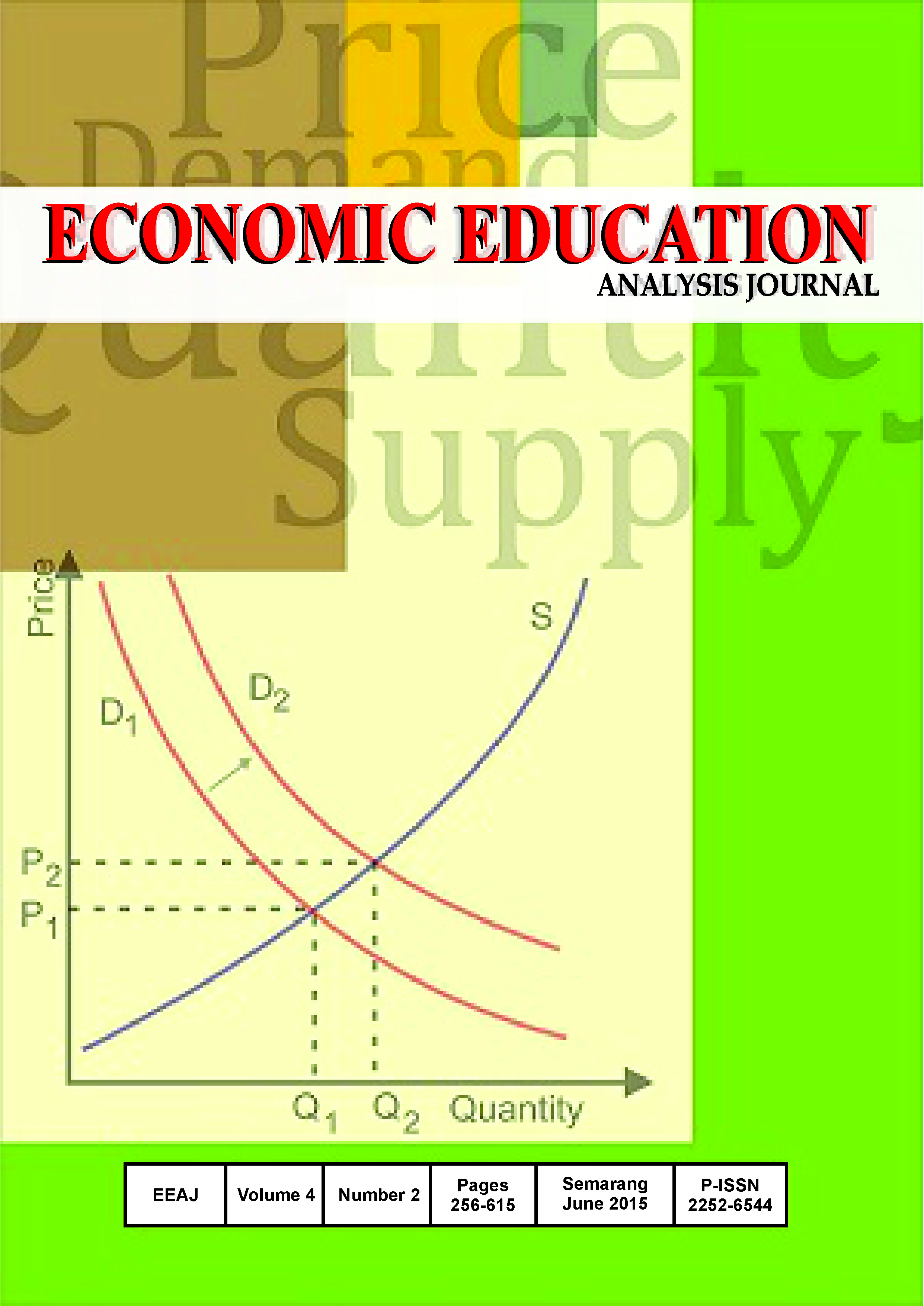PENGARUH SELF EFFICACY, PRESTISE PROFESI GURU DAN STATUS SOSIAL EKONOMI ORANG TUA TERHADAP MINAT MENJADI GURU AKUNTANSI PADA MAHASISWA PENDIDIKAN AKUNTANSI 2011 FE UNNES
Main Article Content
Abstract
Minat menjadi guru akuntansi merupakan perasaan suka, tertarik atau perhatian seseorang terhadap profesi guru akuntansi. Minat dapat dipengaruhi beberapa faktor baik intrinsik maupun ekstrinsik. Tujuan dalam penelitian ini adalah untuk mengetahui adakah pengaruh self efficacy, prestise profesi guru dan status sosial ekonomi orang tua terhadap minat menjadi guru akuntansi pada mahasiswa program studi pendidikan akuntansi angkatan 2011 FE UNNES baik secara simultan maupun parsial. Populasi dalam penelitian ini adalah mahasiswa pendidikan ekonomi (akuntansi) angkatan 2011 FE UNNES sebanyak 178 mahasiswa. Penetuan jumlah sampel menggunakan rumus Slovin dan didapat 123 mahasiswa. Teknik pengambilan sampel dengan menggunakan teknik proportional random sampling. Metode pengumpulan data menggunakan metode kuesioner. Metode analisis data menggunakan analisis statistik deskriptif dan statistik inferensial. Hasil perhitungan secara simultan menunjukkan bahwa pengaruh self efficacy, prestise profesi guru dan status sosial ekonomi orang tua terhadap minat menjadi guru akuntansi sebesar 49,9%, sedangkan sisanya 50,1% dipengaruhi oleh faktor lain yang tidak diungkap dalam penelitian ini. Secara parsial besarnya pengaruh pengaruh self efficacy terhadap minat mahasiswa menjadi guru akuntansi sebesar 43,29%, pengaruh prestise profesi terhadap minat menjadi guru akuntansi sebesar 9,42%, dan pengaruh status sosial ekonomi orang tua terhadap minat mahasiswa menjadi guru akuntansi 5,90%.
Interest to become a accounting teachers is feeling like, interested or someone's attention to the accounting teacher profession. Interests can be influenced by several factors, both intrinsic and extrinsic. The purpose of this research is to determine the influence between self-efficacy, students perceptions about the prestige of the teaching profession and socio-economic status of parents to interest become accounting teacher in accounting education students of class of 2011 Economic Faculty of Semarang State University either simultaneously or partially. The population in this study were students of economics education (accounting) class of 2011 Economic Faculty of Semarang State University as many as 178 students. Determination of the number of sampels obtained using the formula Slovin and get 123 students. Sampling technique using proportional random sampling technique. Methods of data collection using questionnaires. Methods of data analysis using descriptive statistical analysis and inferential statistics. Simultaneous calculation results show that the influence of self-efficacy, students perceptions about the prestige of the teaching profession and socio-economic status of parents of interest become teachers accounting for 49.9%, while the remaining 50.1% is influenced by other factors that are not revealed in this study. Partially, the influence of self efficacy influence on the interests of students become teachers accounting for 43.29%, influence students' perceptions about the prestige of the profession to interest to become a teacher of accounting for 9.42%, and the influence of socio-economic status of parents to interests of students into the accounting teacher 5,90%.
Article Details
References
Bakar, Ismail dan Hamzah. 2014. “Teaching as a Career Choice: A Discriminant Analysis of Factors as Perceived by Technical and Vocational Education (TVE) Student Teachers in Malaysiaâ€. Middle-East Journal of Scientific Research 19
Djaali. 2007. Psikologi Pendidikan. Jakarta : Bumi Aksara
Ghozali, Imam. 2011. Aplikasi Analisis Multivariate Dengan Program IBM SPSS 19. Semarang: Badan Penerbit Universitas Diponegoro
Hurlock, Elizabeth. 2010. Perkembangan Anak Jilid 2. Jakarta: Penerbit Erlangga
Lunenburg, Fred C. 2011. “Self-Efficacy in the Workplace: Implication for Motivation and Performanceâ€. International Journal of management, Business, and Administration Volume 14, Number 1
Nasution. 2004. Sosiologi pendidikan. Jakarta: PT Bumi Aksara
Oruc, Nesrin. 2011. “The Perception of Teaching as a Profession by Turkish Trainee Teachers: Attitudes towards Being a Teacherâ€. International Journal of Humanities and Social Science
Ozimek, Adam. 2014. The data shows teachers are still highly respected. www.forbes.com. Diakses 20 februari 2015
Republik Indonesia. 2005. Undang-Undang No 14 Tahun 2005 tentang Guru
dan Dosen. Jakarta: Departemen Pendidikan Nasional.
Republik Indonesia. 2003. Undang-Undang No. 23 tentang Sistem Pendidikan
Nasional. Jakarta: Departemen Pendidikan Nasional
Shaleh, Abdul Rahman dan Wahab, Muhbib Abdul. 2005. Psikologi Suatu Pengantar dalam Perspektif Islam. Jakarta: Prenada Media
Slameto. 2010. Belajar dan Faktor-faktor yang Mempengaruhinya. Jakarta: Rineka Cipta.
Sudjana. 2005. Metoda Statistika. Bandung: Tarsito
Sugiyono. 2009. Metode Penelitian Pendidikan Pendekatan Kuantitaif, Kualitatif dan R&D. Bandung: ALFABETA
Umar, Husein. 2003. Riset Pemasaran dan Perilaku Konsumen. Jakarta: PT Gramedia Pustaka Utama
Woolfolk, Anita. 2009. Educational Psychology: Active Learning Edition. Yogyakarta: Pustaka Pelajar
Zulkosky, Kristen. 2009. Self-Efficacy: A Concept Analysis. Journal Compilatio
